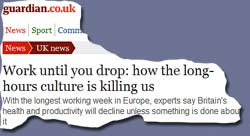Europe To Review Working Time Directive Again
 Unions across Europe are expecting a review of working time rules to tackle the unhealthy problem of long and irregular hours. The European Commission announced a review of the EU-wide working time regulations on 24th March. Requesting opinion of workers and employers, the press release stated:
Unions across Europe are expecting a review of working time rules to tackle the unhealthy problem of long and irregular hours. The European Commission announced a review of the EU-wide working time regulations on 24th March. Requesting opinion of workers and employers, the press release stated:
"The European Commission has today requested the views of workers' and employers' representatives on the options for reviewing EU rules on working time. The first stage consultation asks the European social partners at whether action is needed at EU level on the Working Time Directive (2003/88/EC) and what scope it should take. This represents the first step towards a comprehensive review of the Directive and comes after previous the attempts to revisit the existing legislation reached an impasse in April 2009."
Quoting,
László Andor, EU Commissioner for Employment, Social Affairs and Inclusio:
"The failure to reach an agreement on revising the working time legislation last year does not mean the problems around the existing rules have gone away. We still need to find a balanced solution that addresses the real needs of workers, businesses and consumers in the 21st century." He underlined: "We need a comprehensive review of the rules based on a thorough impact assessment with a strong social dimension. Today we invite the social partners to reflect broadly on this crucial issue and to come forward with innovative proposals that move beyond unsuccessful debates of the past."
The European Trade Union Confederation (ETUC) responded in it's own press release stating that it wanted a 'balanced' and 'negotiated' solution with safety at its core.
 ETUC General Secretary and former General Secretary of the TUC,
John Monks was quoted as saying,
ETUC General Secretary and former General Secretary of the TUC,
John Monks was quoted as saying,
"There is a clear link between long and irregular working hours and increased work-related health problems. Although the world of work has changed, this evidence has not changed since the first legislation on working time, nor since we last discussed the revision of the working time directive.
Protection of the health and safety of workers must therefore remain the primary goal of any review of the working time directive. This is of crucial importance for all workers, but in particular where workers in the performance of their jobs can affect the lives of third parties, for instance in healthcare professions or transport."
The press release goes further:
The ETUC criticizes in particular that the European Commission has allowed the erosion of the existing Working Time Directive. In stark contrast to the way the jurisprudence of the European Court of Justice (ECJ) in other areas has been taken up, the Commission has refused to implement the consistent ECJ rulings about on-call work, and has failed to take Member States to task.
“We have many case studies demonstrating the capacity of social partners at national and sectoral level to develop and agree innovative practices of organizing working time. But we need clear and unambiguous European minimum standards on working time and an end to the opt-out from the Working Time Directive to provide a solid basis for negotiated solutions,” says Catelene Passchier, ETUC Confederal Secretary.
She continued:
“We also have to better define the win-win potential for workers and employers in designing intelligent solutions for the organization of working time. Investing in healthy and sustainable working time patterns may imply short terms costs, but not investing in this might come at a much higher price for economies and societies. A number of sectors in the economy will face dramatic staff shortages in the years to come. Improving work – life balance is one important factor to contribute to job satisfaction and enhanced productivity; it is not only good for women and men with care responsibilities, but also allows workers to actively age and stay longer in work.”
Source: EC / ETUC / TUC Risks